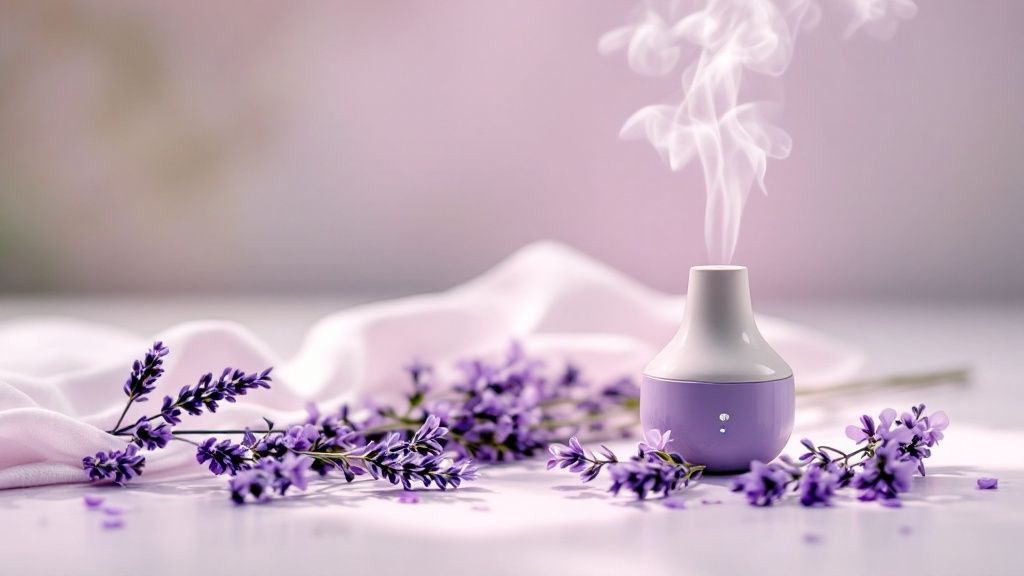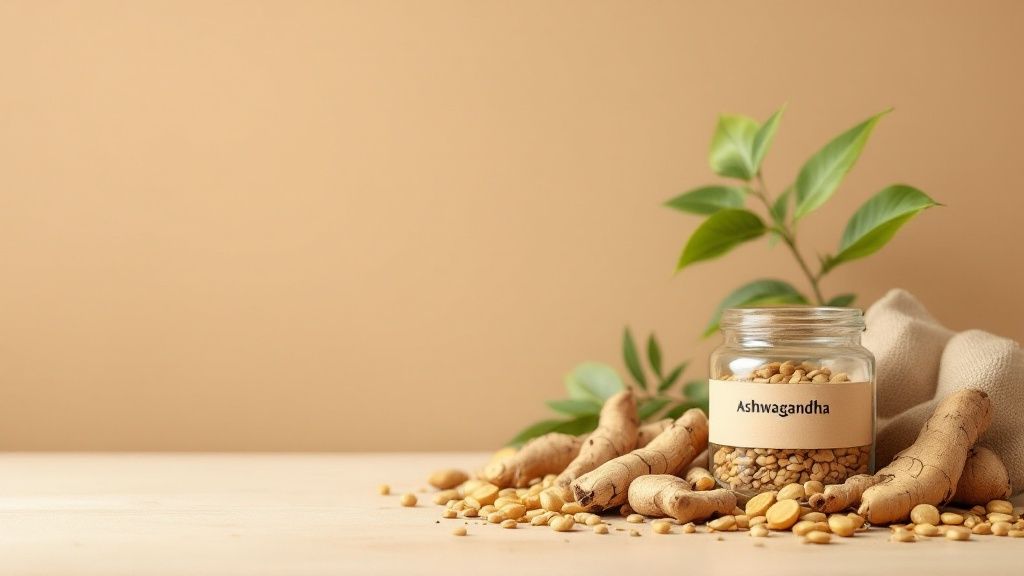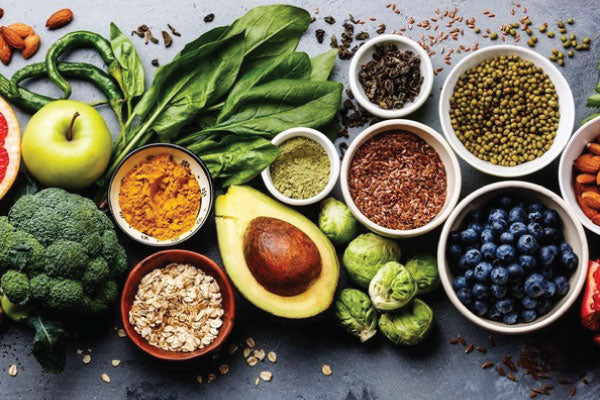Understanding Anxiety and Finding Natural Relief
Feeling anxious? This listicle provides natural remedies for anxiety, including SMOKO CBD products and lifestyle adjustments, to help restore calm to your being. Learn what anxiety is, its symptoms (like excessive worry, restlessness, and sleep issues), and how CBD interacts with your body to potentially alleviate these symptoms. We'll explore broad-spectrum CBD, SMOKO product options, dosing recommendations, and other natural anxiety-reducing strategies like exercise, meditation, and spending time in nature. Discover how combining these approaches can create a powerful, holistic approach to managing anxiety effectively.
1. Mindfulness Meditation
Mindfulness meditation is a natural remedy for anxiety that involves focusing your mind on present-moment experiences without judgment. It's a mental training practice that teaches you to recognise and manage anxious thoughts without becoming overwhelmed. This involves finding a comfortable seated position, focusing on your breath, and gently guiding your attention back to the present whenever your mind wanders. When practiced regularly, mindfulness meditation can significantly reduce anxiety by creating a space between you and your anxious thoughts.

Anxiety is a natural human response to stress, but when it becomes excessive or persistent, it can interfere with daily life. Symptoms can include excessive worrying, restlessness, difficulty concentrating, irritability, muscle tension, sleep disturbances, and even panic attacks. CBD (cannabidiol), a non-intoxicating compound found in the hemp plant, interacts with the body's endocannabinoid system (ECS), which plays a crucial role in regulating mood, sleep, and the stress response. Research suggests that CBD may help alleviate anxiety by interacting with serotonin receptors in the brain, potentially reducing anxious feelings and promoting a sense of calm. Other benefits of CBD that may indirectly improve anxiety symptoms include its potential to improve sleep quality and reduce pain, both of which can contribute to overall anxiety levels.
SMOKO CBD products offer broad-spectrum CBD, meaning they contain a range of beneficial cannabinoids and terpenes found in hemp, but without THC (the psychoactive compound in cannabis). For anxiety, consider starting with SMOKO CBD oral drops, taking a few drops under the tongue as needed, and gradually increasing the dosage as directed. It's crucial to consult with a healthcare professional before starting any new supplement regimen, especially if you have pre-existing health conditions or are taking other medications.
Mindfulness meditation deserves a place on this list of natural remedies for anxiety because it is a scientifically proven, cost-free, and accessible method for managing anxiety symptoms. It requires no equipment and can be practiced anywhere, even for just a few minutes each day. Features include its focus on present-moment awareness and its adaptability to various settings. Benefits include long-term stress resilience and improved mental clarity.
Pros: Scientifically proven to reduce anxiety symptoms, cost-free, easily integrated into daily routine, builds long-term stress resilience, improves overall mental clarity.
Cons: Requires regular practice for optimal results, can be challenging for beginners, benefits are gradual, may not be sufficient for severe anxiety without additional treatment.
Examples: The University of Massachusetts Medical School's Mindfulness-Based Stress Reduction (MBSR) program and Google's "Search Inside Yourself" program have demonstrated the effectiveness of mindfulness in reducing anxiety. Popularised by figures like Jon Kabat-Zinn and Thich Nhat Hanh, mindfulness has become increasingly mainstream through apps like Headspace and Calm, and endorsements from celebrities like Oprah Winfrey and Hugh Jackman.
Tips for Practicing Mindfulness Meditation:
-
Start with just 5 minutes daily and gradually increase the duration.
-
Use guided meditations (apps like Headspace or Calm can be helpful for beginners).
-
Establish a consistent daily practice, ideally at the same time each day.
-
Gently redirect your attention back to your breath whenever your thoughts wander.
-
Explore body scan meditation to address physical anxiety symptoms.
While CBD and mindfulness can be powerful tools, incorporating other natural anxiety-reducing strategies can create a more holistic approach. These include physical exercise, breathing exercises, spending time in nature, engaging in enjoyable activities, and organising/addressing tasks. A combination of these methods is likely to have a more profound and lasting impact on anxiety than relying on a single approach.
2. Regular Physical Exercise
Regular physical activity is one of the most effective natural remedies for anxiety. When we experience anxiety, our bodies release stress hormones like cortisol and adrenaline. Exercise helps to regulate these hormones, reducing their negative impact. Simultaneously, physical activity stimulates the production of endorphins, which are natural mood boosters and have a calming effect. Beyond the immediate hormonal influence, regular exercise also improves sleep quality and boosts self-confidence, both of which contribute to lower anxiety levels over time. This makes exercise a powerful tool in managing anxiety naturally.

This natural anxiety treatment encompasses a wide range of activities, from brisk walking and running to swimming, yoga, and strength training. Both aerobic exercises (like cardio) and anaerobic exercises (like weightlifting) offer benefits. Furthermore, the advantages of exercise for anxiety relief can be experienced both immediately after a workout and cumulatively with consistent practice. This is because exercise works through multiple physiological mechanisms to combat anxiety.
Features and Benefits:
-
Diverse Activities: Caters to various preferences and fitness levels.
-
Dual Exercise Types Effective: Both aerobic and anaerobic exercises provide anxiety-reducing benefits.
-
Short and Long-Term Benefits: Experience immediate relief and cumulative improvements.
-
Multifaceted Physiological Impact: Works through hormonal regulation, endorphin release, sleep improvement, and confidence boosts.
Pros:
-
Rapid Anxiety Relief: Often noticeable within minutes of starting physical activity.
-
Cumulative Benefits: Regular exercise leads to sustained reductions in anxiety levels.
-
Holistic Health Improvement: Enhances both physical and mental well-being.
-
Adaptable to All Fitness Levels: Modifications can be made for beginners or those with physical limitations.
-
Social Interaction: Group classes or team sports can provide social support and connection.
Cons:
-
Motivation and Time Commitment: Requires dedication to a regular exercise schedule.
-
Physical Limitations: Some individuals may face challenges due to existing health conditions.
-
Potential for Increased Anxiety: Overly intense workouts can be counterproductive, especially for beginners.
-
External Factors: Weather or other circumstances may disrupt outdoor exercise routines.
Examples of Success:
-
Harvard Health reports that just 10 minutes of brisk walking can provide immediate anxiety relief.
-
A large-scale Norwegian study demonstrated that individuals who exercised regularly had 20% lower anxiety levels over a 12-year period.
Tips for Implementing Exercise to Combat Anxiety:
-
Consistency is Key: Aim for at least 30 minutes of moderate-intensity exercise five times a week.
-
Enjoyable Activities: Choose activities you find pleasurable to maintain long-term adherence.
-
Gradual Progression: Start with shorter, less intense workouts and gradually increase the duration and intensity.
-
Accountability and Support: Consider joining group classes or finding an exercise buddy for motivation and accountability.
-
Embrace the Outdoors: Outdoor exercise can provide additional benefits for anxiety reduction by connecting you with nature.
Regular exercise deserves a prominent place on this list of natural remedies for anxiety because it offers a readily accessible, highly effective, and sustainable approach to managing anxiety. It empowers individuals to take control of their mental well-being through proactive, healthy habits. When combined with other natural remedies, such as incorporating SMOKO CBD products for athletic recovery and other benefits into your routine, the positive effects can be amplified, providing a more comprehensive approach to anxiety management.
3. Chamomile
Chamomile earns its place on this list of natural remedies for anxiety due to its long history of use and gentle yet effective action. This medicinal herb has been a go-to for centuries, offering relief from both anxiety and insomnia. Its calming properties stem from apigenin, an antioxidant that binds to specific benzodiazepine receptors in the brain, similar to how some anti-anxiety medications work. This interaction may decrease anxiety and promote relaxation and sleep. Chamomile's accessibility, affordability, and pleasant taste make it an appealing option for those seeking natural anxiety relief within the UK.
How Chamomile Works for Anxiety:
Chamomile's primary anxiety-reducing component, apigenin, interacts with receptors in the brain that are also targeted by benzodiazepine medications, a class of drugs commonly prescribed for anxiety. By binding to these receptors, apigenin may help calm the nervous system and reduce feelings of anxiety. Furthermore, chamomile possesses anti-inflammatory properties that may contribute to its overall calming effect, as chronic inflammation can exacerbate anxiety symptoms.
Examples of Chamomile's Effectiveness:
-
A University of Pennsylvania study demonstrated that chamomile supplements significantly reduced anxiety symptoms in participants diagnosed with generalised anxiety disorder.
-
Traditional German chamomile tea rituals have long been associated with stress reduction across generations, highlighting its enduring cultural significance.
Tips for Using Chamomile:
-
Tea: Steep 1-2 teaspoons of dried chamomile flowers in hot water for 10 minutes. Drink 1-3 cups daily, including one cup roughly 30 minutes before bedtime.
-
Supplements: Look for supplements standardised to contain 1.2% apigenin for optimal effectiveness.
-
Combination Therapy: Combine chamomile with other calming herbs like lavender or lemon balm for enhanced effects.
-
Professional Guidance: Consult your healthcare provider before using chamomile if you are pregnant, breastfeeding, or taking other medications, especially blood thinners or sedatives.
Pros and Cons of Chamomile for Anxiety:
Pros:
-
Generally recognised as safe with minimal side effects.
-
Widely available and affordable in the UK.
-
Easy incorporation into a daily routine.
-
Offers multiple health benefits beyond anxiety relief.
-
Pleasant taste when consumed as tea.
Cons:
-
Effects may be milder compared to prescription medications.
-
Can trigger allergic reactions in individuals with ragweed allergies.
-
Potential drug interactions with blood thinners and sedatives.
-
Limited clinical research compared to pharmaceutical options.
While chamomile can be a valuable addition to your natural anxiety management toolkit, it's important to remember that addressing anxiety effectively often requires a multifaceted approach. Other natural remedies, such as regular exercise, mindfulness practices like meditation, and spending time in nature, can synergistically complement the benefits of chamomile and contribute to a more holistic sense of well-being. If you are experiencing significant anxiety, consult with a healthcare professional to determine the best course of action for your individual needs. They can help you explore a range of options, including natural remedies like chamomile alongside other evidence-based approaches.
4. Lavender Aromatherapy
When seeking natural remedies for anxiety, lavender aromatherapy often emerges as a top contender. This practice utilises the essential oil extracted from lavender flowers to promote relaxation and alleviate anxiety symptoms. Upon inhalation, the compounds within lavender interact with the limbic system, the brain area responsible for regulating emotions and mood. This interaction specifically targets the amygdala and hippocampus, playing a crucial role in emotional processing and memory. This natural approach has shown promise in significantly reducing anxiety symptoms and improving sleep quality, offering a potential alternative to conventional anxiolytics often associated with unwanted side effects.

Lavender's versatility adds to its appeal. Available as essential oil, dried herbs, teas, and bath products, it offers diverse methods of application. Key components like linalool and linalyl acetate contribute to its anxiolytic effects. These can be experienced through inhalation, topical application (diluted), or oral consumption in appropriate forms like teas. A notable benefit of lavender aromatherapy is its rapid action – effects are often noticeable within minutes of inhalation.
Why Lavender Deserves its Place on the List:
Lavender aromatherapy's inclusion in natural remedies for anxiety stems from its several advantages. It is fast-acting when inhaled, non-habit forming, and adaptable to various settings – be it at home, work, or during travel. The pleasant, non-stigmatising scent adds to its appeal, and its availability without a prescription further enhances its accessibility.
Pros and Cons:
While lavender aromatherapy offers many positives, it's essential to acknowledge its limitations. Product quality and potency can vary considerably, and some individuals may have sensitivities or allergies to the scent. Pure essential oils can be relatively expensive, and the effects, while noticeable, are generally temporary. Limited regulatory oversight on product quality is another factor to consider.
Examples of Lavender's Efficacy:
The effectiveness of lavender aromatherapy is supported by research. A 2017 clinical trial published in Mental Health Clinician demonstrated its anxiety-reducing effects in pre-operative patients. Furthermore, Silexan, a specific lavender oil preparation, has shown comparable efficacy to lorazepam, a conventional anti-anxiety medication, in clinical studies.
Tips for Using Lavender Aromatherapy:
-
Ambient anxiety relief: Add 2-3 drops of lavender essential oil to a diffuser.
-
Portable relief: Place a few drops on a handkerchief.
-
Relaxing bath: Add 10-12 drops to warm bathwater.
-
Topical application: Apply diluted oil (2% concentration) to temples or wrists.
-
Sleep anxiety: Keep a lavender sachet under your pillow.
5. L-theanine: A Natural Soother for Anxiety
Anxiety is a natural human response to stress, but when it becomes persistent and overwhelming, it can significantly impact our daily lives. Symptoms can range from persistent worrying and irritability to physical manifestations like a racing heart, shortness of breath, and difficulty sleeping. Finding natural remedies for anxiety can be a valuable tool in managing these symptoms and regaining control. L-theanine earns its place on this list as a safe, natural, and readily available option for promoting relaxation and reducing anxiety without unwanted side effects like drowsiness.
L-theanine is a naturally occurring amino acid primarily found in tea leaves, especially green tea. It works by crossing the blood-brain barrier and influencing brain wave activity. Specifically, it increases alpha brain waves, which are associated with a state of wakeful relaxation – the calm yet alert feeling you might experience after a mindful meditation session. Beyond its impact on brain waves, L-theanine also affects the production of key neurotransmitters that regulate mood, sleep, and stress responses. It interacts with GABA, serotonin, and dopamine, promoting a sense of calm and well-being, and helps regulate cortisol, the hormone associated with stress.
One of L-theanine’s most significant benefits is its ability to promote relaxation without causing drowsiness or impairing cognitive function. This makes it an excellent choice for individuals seeking natural remedies for anxiety during the day, as it won't interfere with work or daily tasks. In fact, it can even improve focus and attention while simultaneously reducing anxiety. This characteristic distinguishes L-theanine from other natural sedatives and makes it particularly appealing for those seeking relief from anxiety without sacrificing alertness.
Examples of L-theanine's effectiveness:
-
Practitioners of the Japanese tea ceremony, which often involves consuming matcha (high in L-theanine), frequently report sustained calm alertness. This speaks to L-theanine's ability to foster a sense of tranquillity while maintaining mental clarity.
-
A 2019 study showed that L-theanine reduced stress-related symptoms in healthy adults facing cognitive stressors, further validating its potential as a natural anxiety remedy.
Tips for using L-theanine:
-
Dosage: A typical effective dosage ranges from 200-400mg daily.
-
Absorption: Take L-theanine without food for better absorption.
-
Natural sources: Enjoy high-quality green tea, particularly matcha, for a natural source of L-theanine. However, keep in mind that natural sources contain smaller amounts, and supplementation might be necessary for therapeutic effects.
-
Synergistic effects: Combine L-theanine with mindfulness practices like meditation or deep breathing exercises for enhanced effects.
-
Timing: Consider taking L-theanine before stressful events or in the evening to alleviate sleep anxiety.
Pros and Cons of L-theanine:
Pros:
-
Non-addictive and generally well-tolerated
-
Does not cause drowsiness or impair cognitive function
-
Can be combined with caffeine to balance stimulating effects
-
Research supports efficacy for anxiety reduction
-
Can improve focus and attention
Cons:
-
Effects may be subtle compared to prescription medications
-
Limited long-term studies on daily supplementation
-
May lower blood pressure, requiring caution in some individuals
-
More expensive than some other natural remedies
While L-theanine offers a compelling natural approach to anxiety relief, integrating other lifestyle changes can further enhance its benefits. Regular physical exercise, breathing exercises, meditation, spending time in nature, pursuing hobbies, and staying organised can all contribute significantly to reducing anxiety. Combining these practices with L-theanine and potentially other natural remedies like CBD can create a holistic approach to managing anxiety and improving overall well-being. Remember, a multifaceted strategy is often more effective than relying on a single solution.
6. Magnesium Supplementation: A Natural Remedy for Anxiety
While several approaches exist to manage anxiety, natural remedies are increasingly popular. Magnesium supplementation is one such remedy, offering a potentially effective way to address a common nutritional deficiency that can contribute to anxiety.
Magnesium plays a crucial role in brain function and mood regulation. It helps regulate neurotransmitters, the chemical messengers that transmit signals throughout the brain and nervous system. One crucial neurotransmitter influenced by magnesium is GABA, an inhibitory neurotransmitter that helps calm the nervous system and reduce anxiety. Magnesium also helps regulate the hypothalamic-pituitary-adrenal (HPA) axis, which controls the body's response to stress, including the release of the stress hormone cortisol. By supporting healthy HPA axis function, magnesium can help manage the physiological response to stress and potentially alleviate anxiety symptoms.
A deficiency in magnesium, common in Western diets, has been linked to increased anxiety, stress, and even depression. Supplementing with magnesium can help restore optimal levels and potentially reduce anxiety symptoms.
Features and Benefits of Magnesium Supplementation:
-
Various forms: Available as magnesium glycinate, citrate, malate, and chloride, offering options for different needs and absorption rates.
-
Natural calcium channel blocker: Magnesium acts as a natural calcium channel blocker, which can have calming effects on the nervous system.
-
GABA support: Magnesium supports the function of GABA, promoting relaxation and reducing anxiety.
-
Cortisol regulation: Helps regulate cortisol levels, mitigating the physiological impact of stress.
-
Improved sleep: Magnesium can improve sleep quality, which is often disrupted in individuals experiencing anxiety.
Pros:
-
Addresses a common nutritional deficiency.
-
Offers benefits beyond mental health, supporting overall well-being.
-
Non-addictive and generally safe when taken as directed.
-
Various forms cater to individual needs and absorption preferences.
-
Can improve related conditions like insomnia and muscle tension.
Cons:
-
Can cause digestive discomfort (like loose stools) at higher doses.
-
May interact with certain medications (e.g., antibiotics).
-
Different forms have varying bioavailability and effects.
-
Not recommended for individuals with kidney disease.
-
May take several weeks of consistent use to experience full benefits.
Examples of Effectiveness:
-
A 2017 review in Nutrients found magnesium supplementation effective for mild-to-moderate anxiety.
-
The American Psychological Association has highlighted research connecting magnesium deficiency with increased anxiety.
Tips for Using Magnesium:
-
Magnesium glycinate is often recommended for anxiety due to its good bioavailability and minimal digestive side effects.
-
Typical dosages range from 200-400mg of elemental magnesium daily.
-
Take magnesium with food to improve absorption and reduce the likelihood of digestive upset.
-
Consider topical magnesium oil or Epsom salt baths for alternative absorption routes.
-
Start with a lower dose and gradually increase to assess your tolerance.
Magnesium supplementation deserves its place on this list due to its potential to address a fundamental nutritional deficiency that can contribute to anxiety. While it is not a quick fix, consistent use as part of a holistic approach to anxiety management may offer significant benefits. This approach may also include incorporating other natural remedies and lifestyle changes, such as regular exercise, breathing exercises, spending time in nature and ensuring you get enough quality sleep. It's always advisable to consult with a healthcare professional, particularly if you have any underlying health conditions or are taking other medications.
7. Ashwagandha
Ashwagandha ( Withania somnifera ) is a powerful adaptogenic herb revered in Ayurvedic medicine for its ability to help the body resist physical and mental stress. Ashwagandha works by modulating the body's stress response system, primarily by regulating cortisol levels – often referred to as the "stress hormone" – and supporting healthy adrenal gland function. Research indicates that ashwagandha can significantly reduce anxiety symptoms, improve stress resilience, and enhance overall well-being without the side effects often associated with conventional anti-anxiety medications. This makes it a valuable tool in a holistic approach to managing anxiety, alongside other natural remedies and lifestyle adjustments.

Ashwagandha is classified as an adaptogen, meaning it helps the body adapt to various stressors. It contains active compounds called withanolides, which contribute to its anxiolytic (anxiety-reducing) effects. This herb is available in various forms, including powder, capsules, tinctures, and teas. Its effects are cumulative, meaning consistent use over time yields the best results. Interestingly, ashwagandha also supports thyroid function, which can significantly influence anxiety levels.
Why Ashwagandha Deserves its Place on the List: Ashwagandha earns its spot as a natural remedy for anxiety due to its clinically-backed efficacy, multifaceted approach to stress management, and generally good tolerability. It addresses multiple aspects of the stress response, offering additional benefits like improved energy and cognitive function. Its long history of traditional use, spanning thousands of years, further strengthens its credibility.
Features and Benefits:
-
Adaptogenic Properties: Helps the body cope with stress.
-
Withanolides: Contribute to anxiety reduction.
-
Various Forms: Available as powders, capsules, tinctures, and teas.
-
Thyroid Support: Addresses a potential underlying factor in anxiety.
Pros:
-
Clinically proven to reduce anxiety symptoms.
-
Addresses multiple aspects of the stress response.
-
Generally well-tolerated with few side effects.
-
Improves energy levels and cognitive function.
-
Backed by a long history of traditional use.
Cons:
-
Can take several weeks for full effects to manifest (2-12 weeks).
-
Potential interactions with thyroid medications, sedatives, and immunosuppressants.
-
May increase testosterone levels, potentially affecting hormone-sensitive conditions.
-
Quality and potency of supplements can vary.
-
Bitter taste in powder form.
Examples of Successful Implementation: A 60-day study published in the Journal of Clinical Psychopharmacology demonstrated a significant reduction in anxiety scores (56.5%) with ashwagandha compared to placebo (30.5%). Anecdotally, many high-stress professionals report using ashwagandha to manage demanding workloads without experiencing performance decline.
Tips for Using Ashwagandha:
-
Standardised Extracts: Choose standardised extracts containing 5% withanolides.
-
Dosage: A common effective dosage is 300-500mg twice daily.
-
Absorption: Take with meals that include some healthy fats to improve absorption.
-
Timing: Morning dosing may help prevent any potential mild energy boost from affecting sleep.
-
Holistic Approach: Combine ashwagandha with other natural remedies and healthy lifestyle practices, like regular exercise, a balanced diet, and sufficient sleep, for enhanced effects.
8. Omega-3 Fatty Acids: A Natural Remedy for Anxiety
While there are many ways to manage anxiety, incorporating omega-3 fatty acids into your routine offers a natural and potentially effective approach. This essential nutrient plays a crucial role in brain health, making it a valuable addition to a holistic anxiety management plan alongside other natural remedies.
Omega-3 fatty acids are essential polyunsaturated fats vital for brain function and development. Specifically, EPA (eicosapentaenoic acid) and DHA (docosahexaenoic acid) are the two types most studied for their mental health benefits. These fatty acids, primarily found in fatty fish, help reduce inflammation, regulate neurotransmitters (chemical messengers in the brain), and maintain the health of brain cell membranes. This multifaceted action contributes to their anxiety-reducing properties.
How Omega-3s Combat Anxiety: Omega-3s work through several pathways to help manage anxiety. They modulate the body's stress response, meaning they can help dampen the intensity of your reaction to stressors. They also support optimal neurotransmitter function, which is essential for a balanced mood. Furthermore, by reducing inflammation, omega-3s address a potential underlying contributor to both anxiety and depression.
Examples of Omega-3s Effectiveness:
-
A meta-analysis published in JAMA Network Open demonstrated a significant reduction in clinical anxiety symptoms with omega-3 supplementation.
-
Countries with higher fish consumption, such as Japan, consistently show lower rates of anxiety in population studies. This correlation highlights the potential protective effect of dietary omega-3 intake.
Benefits of Omega-3 for Anxiety Relief:
-
Strong Scientific Evidence: Numerous studies support the neurological benefits of omega-3s, lending credibility to their use for anxiety.
-
Safe for Long-Term Use: Omega-3s are generally safe for long-term use with few side effects, making them a sustainable option for ongoing anxiety management.
-
Holistic Brain Health: The benefits extend beyond anxiety to overall brain health, including cognitive function and mood regulation.
-
Non-Habit Forming & Non-Sedating: Unlike some anxiety medications, omega-3s are non-habit forming and won't make you drowsy.
-
Vegetarian-Friendly: Algae-based supplements offer a plant-based source of EPA and DHA for vegetarians and vegans.
Potential Drawbacks:
-
Delayed Effects: Consistent supplementation may be needed for several weeks before noticeable effects occur.
-
Mild Digestive Issues: Fish oil can sometimes cause mild digestive discomfort or "fishy burps."
-
Supplement Quality Varies: The quality of omega-3 supplements can vary significantly. Look for reputable brands with third-party testing.
-
Cost: High-quality supplements can be more expensive.
-
Potential Interactions: Omega-3s may interact with blood-thinning medications. Consult with your doctor or pharmacist if you're on any medication.
Tips for Using Omega-3s for Anxiety:
-
EPA over DHA: For anxiety, look for supplements with a higher EPA content than DHA.
-
Dosage: Effective doses for anxiety typically range from 1,000-2,000mg combined EPA/DHA daily.
-
Absorption: Take omega-3 supplements with meals containing fat for better absorption.
-
Storage: Store supplements in the refrigerator after opening to prevent rancidity.
-
Dietary Sources: Include wild-caught fatty fish like salmon, mackerel, and sardines in your diet 2-3 times per week.
Omega-3s earn their place on this list due to the substantial scientific evidence supporting their role in brain health and anxiety reduction. Their multiple mechanisms of action, safety profile, and accessibility make them a valuable tool in a comprehensive natural approach to anxiety management. For a more potent effect, consider combining omega-3 supplementation with other natural remedies and lifestyle modifications.
9. Valerian Root: A Natural Remedy for Anxiety
For those seeking natural remedies for anxiety, valerian root stands as a time-tested option. Used medicinally for over two millennia, this perennial flowering plant, native to Europe and Asia, offers a calming and sedative effect. This makes it a worthy addition to our list of natural anxiety remedies, especially for those whose anxiety disrupts sleep or causes physical tension.
How Valerian Root Works:
Valerian root contains valerenic acid and other compounds that interact with gamma-aminobutyric acid (GABA) receptors in the brain. GABA is a neurotransmitter that helps regulate nerve impulses and calm nervous system activity. By enhancing GABA's effects, valerian root induces a calming and sedative effect, similar to how benzodiazepines work, but crucially without the risk of dependency.
Features and Benefits:
-
Available in various forms: capsules, tablets, tinctures, teas, and extracts.
-
Contains valerenic acid, which inhibits the breakdown of GABA in the brain.
-
Possesses mild sedative and muscle-relaxant properties.
-
Effects typically appear within 1-2 hours of consumption.
-
Long history of traditional use, supporting its safety profile.
Pros:
-
Non-addictive alternative to prescription sleep and anxiety medications.
-
Especially helpful for anxiety-related sleep disturbances.
-
Generally well-tolerated with minimal side effects.
-
Can be used on an as-needed basis.
Cons:
-
Pungent, often unpleasant odour, described as resembling "dirty socks."
-
May cause morning grogginess at higher doses taken for sleep.
-
Can interact with alcohol, sedatives, and certain antidepressants.
-
Not recommended during pregnancy or breastfeeding.
-
Supplement quality and potency can vary significantly.
Examples of Effectiveness:
-
A study published in Phytotherapy Research demonstrated valerian extract's effectiveness in reducing anxiety in patients undergoing medical procedures.
-
Germany's Commission E (similar to the FDA) has approved valerian for restlessness and sleep disturbances stemming from nervousness.
Tips for Using Valerian Root:
-
For general anxiety: 120-200mg, three times daily.
-
For sleep-related anxiety: 300-600mg, 30-60 minutes before bedtime.
-
Choose standardised extracts containing 0.8% valerenic acid.
-
Enteric-coated capsules minimise the unpleasant taste and odour.
-
Combining valerian root with lemon balm or hops may enhance its anxiolytic effects.
Why Valerian Root Deserves Its Place:
Valerian root offers a gentle, natural pathway to manage anxiety, especially when it impacts sleep. Its long history of use, combined with scientific backing, makes it a valuable tool for those seeking natural remedies for anxiety. While it's not a replacement for professional medical advice, it provides a potential complement to other anxiety-reducing strategies. Remember to consult with your GP or a qualified healthcare professional before starting any new supplement, especially if you're taking other medications or have underlying health conditions.
10. Deep Breathing Techniques
Deep breathing techniques are powerful, readily available natural remedies for anxiety. These controlled breathing exercises actively engage the parasympathetic nervous system, the body's natural "rest and digest" mechanism. This directly counters the sympathetic nervous system's "fight-or-flight" response, which is the root of anxiety symptoms. By shifting from shallow chest breathing to deep, diaphragmatic breathing – engaging the diaphragm and fully expanding the lungs – these techniques bring about a cascade of positive physiological changes. They reduce heart rate, lower blood pressure, release muscle tension, and bring clarity to a racing mind. This makes them one of the most accessible and immediate natural interventions for anxiety, requiring no special equipment and yielding noticeable results within minutes. They deserve a place on this list because of their effectiveness, accessibility, and ease of implementation.
Deep breathing exercises are particularly valuable because they can be practised anywhere, anytime. Various methods exist, including diaphragmatic breathing, the 4-7-8 technique, box breathing, alternate nostril breathing, and the Wim Hof technique. They work by directly influencing the vagus nerve, a key component of the parasympathetic nervous system, and the autonomic nervous system as a whole. Consistent practice provides both immediate and cumulative benefits. Sessions can range from 30 seconds to 20 minutes, depending on individual needs.
Pros:
-
Immediate physiological effect on anxiety symptoms
-
Cost-free and accessible to everyone
-
Discreet practice possible in public settings
-
Can be combined with other anxiety management strategies
-
No side effects or contraindications
Cons:
-
Requires conscious awareness and practice to implement during anxiety episodes
-
May be difficult to perform during severe panic attacks
-
Some techniques require practice to master
-
May not be sufficient for severe anxiety disorders
-
Initial practice may feel uncomfortable for chronic chest breathers
Examples of Successful Implementation:
-
Navy SEALs utilise box breathing (4-4-4-4 count) for stress management in high-pressure scenarios.
-
Hospitals are increasingly teaching breathing techniques for pre-surgery anxiety management, with documented success rates.
Tips for Effective Practice:
-
For beginners, the 4-7-8 technique is a good starting point: inhale for a count of 4, hold for 7, and exhale for 8.
-
Practice when calm to develop the skill for anxious moments.
-
Place one hand on the chest and one on the abdomen to ensure proper diaphragmatic movement.
-
Schedule brief breathing sessions throughout the day, especially before stressful events.
-
Use breathing apps like Breathwrk or Prana Breath for guided practice.
Popularised By:
-
Dr. Herbert Benson (relaxation response research)
-
Dr. Andrew Weil (popularised 4-7-8 breathing)
-
Yoga and meditation traditions
-
Military and first responder training programs
-
Wim Hof (Wim Hof Technique)
Alongside deep breathing, other natural remedies for anxiety include physical exercise, meditation, spending time in nature, engaging in enjoyable activities, and organising tasks. Combining these practices with CBD products and seeking professional guidance is likely to yield a more comprehensive and beneficial effect than relying on a single approach. Remember, consistent effort across multiple lifestyle areas is key to effectively managing anxiety.
10 Natural Anxiety Remedies Comparison
|
Remedy |
🔄 Implementation Complexity |
⚡ Resource Requirements |
📊 Expected Outcomes |
💡 Ideal Use Cases |
⭐ Key Advantages |
|---|---|---|---|---|---|
|
Mindfulness Meditation |
Moderate – requires consistent practice |
Minimal – no equipment; guided apps optional |
Gradual anxiety reduction and enhanced mental clarity |
Daily stress management and long-term resilience |
Cost-free, well-researched, highly flexible |
|
Regular Physical Exercise |
Moderate to high – needs routine planning and motivation |
Varies – may require space, equipment, or gym access |
Immediate relief combined with cumulative physical and mental health benefits |
People seeking overall health improvement and stress relief |
Multifaceted benefits, boosts mood and fitness |
|
Chamomile |
Easy – simple preparation (tea or supplement) |
Minimal – widely available as tea or supplements |
Mild-to-moderate reduction in anxiety and promotion of relaxation |
Mild anxiety relief and sleep aid |
Accessible, safe, and offers additional health perks |
|
Lavender Aromatherapy |
Easy – use via diffusers or topical application |
Minimal – essential oils and diffuser or direct inhalation |
Fast-acting relief and mood improvement |
On-the-go relaxation and pre-surgery or work-related stress |
Quick, non-habit forming, and pleasantly aromatic |
|
L-theanine |
Easy – straightforward supplement intake |
Minimal – supplement or high-quality tea |
Promotes relaxation without sedation while enhancing focus |
Work or study stress management, especially with caffeine |
Non-addictive, research-supported, enhances focus |
|
Magnesium Supplementation |
Moderate – dosing and monitoring needed |
Modest – supplements or dietary changes |
Reduces anxiety, improves sleep and relieves muscle tension |
Addressing nutritional deficiencies and chronic stress |
Multi-system benefits, safe when used properly |
|
Ashwagandha |
Moderate – requires consistent use over several weeks |
Modest – available as powder, capsules, or tinctures |
Significant anxiety reduction and improved stress resilience |
Chronic stress management and long-term adaptogenic support |
Clinically supported, tradition-rich, broad benefits |
|
Omega-3 Fatty Acids |
Easy – consistent supplementation or dietary adjustment |
Varies – supplements or fatty fish/algae sources |
Long-term enhancement of brain function with reduced anxiety over time |
Dietary support for overall mental and cardiovascular health |
Broad neurological benefits, safe, multi-system aid |
|
Valerian Root |
Easy to moderate – dosing and timing; odour may be an issue |
Minimal – available as tea, capsules, or extracts |
Improved sleep quality and reduced anxiety, especially sleep-induced anxiety |
Sleep-related anxiety and mild anxiety management |
Non-addictive, time-tested, versatile administration |
|
Deep Breathing Techniques |
Easy – simple method learned with practice |
None – no equipment needed |
Immediate stress reduction with lower heart rate and enhanced calmness |
On-the-spot anxiety relief and public stress management |
Inexpensive, accessible, and highly effective |
SMOKO CBD for Anxiety Management
CBD (cannabidiol) is a non-intoxicating compound found in the hemp plant. It interacts with the body's endocannabinoid system (ECS), a complex network of receptors and neurotransmitters that play a role in regulating mood, sleep, pain, and other physiological functions. While research is still ongoing, CBD appears to directly improve anxiety symptoms by modulating the activity of serotonin receptors in the brain, which are involved in mood regulation, and preventing the breakdown of 'anandamide', also known as the 'bliss molecule'. Additionally, its potential anti-inflammatory and neuroprotective properties may indirectly contribute to anxiety relief by addressing underlying factors that can exacerbate anxiety.
Other benefits of CBD that can help reduce anxiety include improved sleep quality and reduced pain. SMOKO offers a range of broad-spectrum CBD products, including soft-gel CBD capsules, CBD tinctures and CBD gummy bears. Broad-spectrum means it contains a range of beneficial cannabinoids and terpenes found in hemp, but without any THC (the psychoactive component of cannabis), to take advantage of something known as the 'entourage effect' - the synergistic action of cannabinoids, terpenes and flavonoids working together to increase the effect.
A suggested dosing regimen for anxiety could start with a low dose of SMOKO CBD oil, such as 10mg twice daily, gradually increasing as needed until finding the optimal dose. Consult with a healthcare professional for personalised advice. It is important to note that while CBD shows promise for anxiety relief, it's not a substitute for professional medical advice. If you're struggling with anxiety, consult with a healthcare professional in the UK for proper diagnosis and treatment.
A Holistic Approach to Anxiety Management
Managing anxiety naturally involves understanding its root causes and addressing them through a combination of lifestyle adjustments and targeted natural remedies for anxiety. Throughout this article, we've explored a range of options, from incorporating calming herbs like chamomile, lavender, and valerian root, to leveraging the power of mindfulness meditation, deep breathing techniques, regular exercise, and ensuring adequate intake of nutrients like magnesium and omega-3 fatty acids. We also discussed the potential benefits of L-theanine and ashwagandha. In addition, we've delved into the world of CBD, specifically SMOKO CBD products, and how their broad-spectrum formula interacts with the body's endocannabinoid system to potentially alleviate anxiety symptoms. Remember, while these individual strategies can offer relief, a multi-faceted approach is often most effective.
For those seeking a more in-depth exploration of natural anxiety relief, check out this comprehensive guide: Effective Natural Remedies for Anxiety Relief. It provides further insights into managing anxiety through natural means.
Mastering these natural remedies for anxiety empowers you to take control of your well-being, reduce reliance on pharmaceuticals, and cultivate a calmer, more balanced life. By weaving these practices into your daily routine and addressing the root causes of your anxiety, you can experience not only relief from anxiety symptoms but also improved sleep, increased focus, enhanced mood, and a greater sense of overall wellness. Start small, be patient with yourself, and remember that consistency is key.
Ready to explore the potential of CBD as part of your holistic anxiety management plan? Discover the range of SMOKO CBD products at SMOKO CBD and see how incorporating broad-spectrum CBD can contribute to your journey towards natural anxiety relief!









